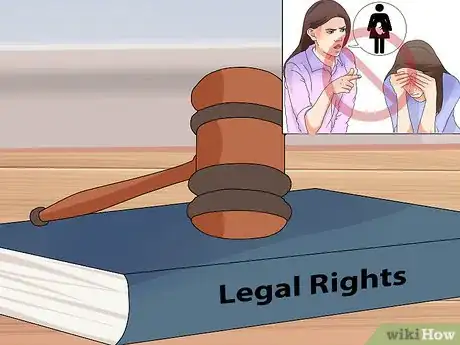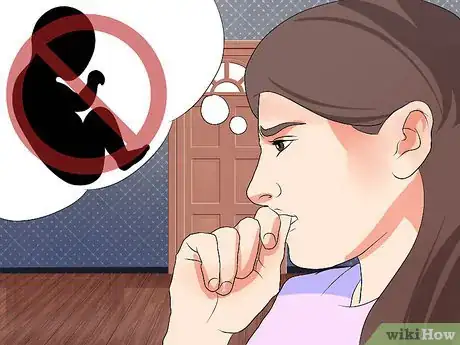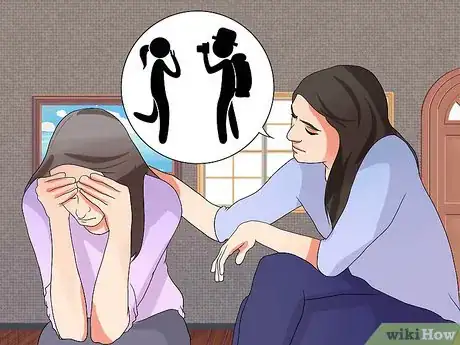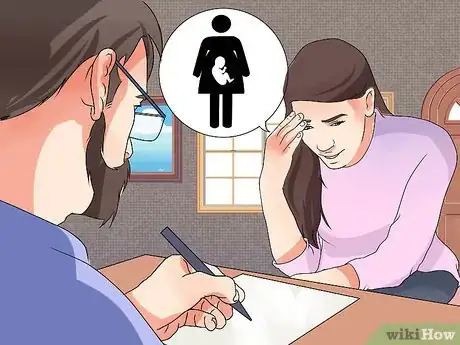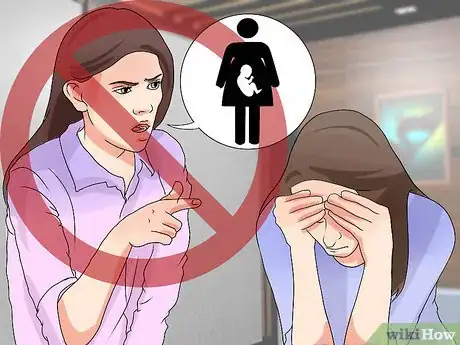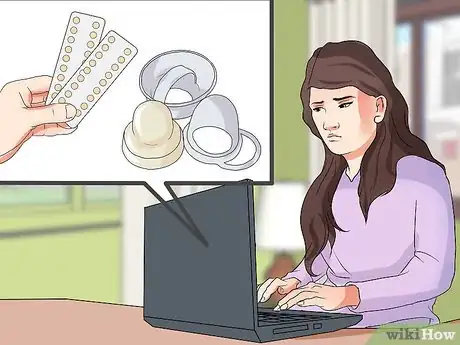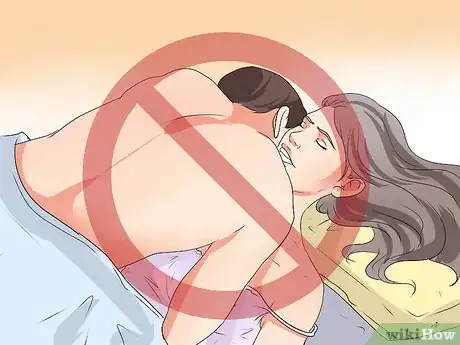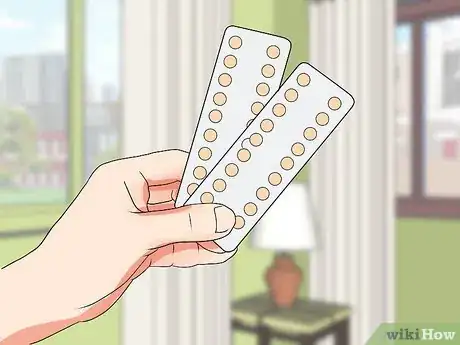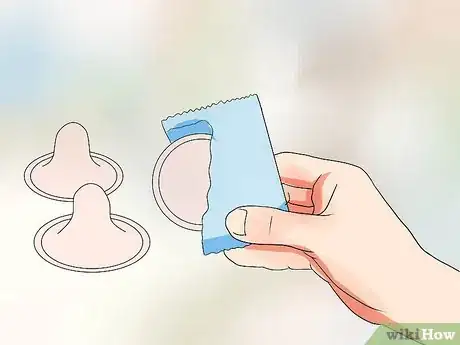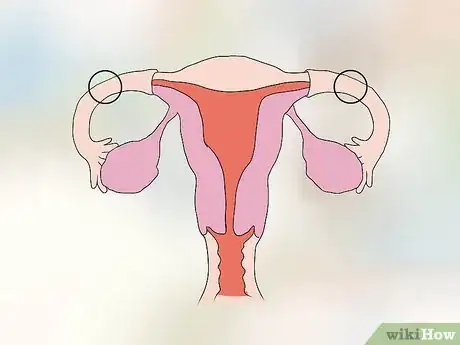This article was co-authored by Trudi Griffin, LPC, MS. Trudi Griffin is a Licensed Professional Counselor in Wisconsin specializing in Addictions and Mental Health. She provides therapy to people who struggle with addictions, mental health, and trauma in community health settings and private practice. She received her MS in Clinical Mental Health Counseling from Marquette University in 2011.
There are 13 references cited in this article, which can be found at the bottom of the page.
This article has been viewed 143,024 times.
Whether you are already pregnant or are worried about the possibility of an unplanned pregnancy, it's important to understand your options. Many women in America think abortion is their only option. During a difficult situation, women need to have all possible options clearly presented to them. Adoption or parenting the child herself are two options that are available. Adoption is not as difficult as many people think. Though when you first learn of your unexpected pregnancy it may be overwhelming, many women soon realize that they can’t imagine life without their precious little one. When it comes to preventing the need for an abortion, the best thing you can do is be proactive about practicing an effective birth control method.
Steps
Dealing With an Unwanted Pregnancy
-
1Know your legal rights. In the USA, no one, not even your parents, can force you to have an abortion against your will. The choice is up to you, so don't let anyone pressure you into making a decision that you are not comfortable with.[1]
- Forcing a minor to have an abortion is considered child abuse, which is illegal.
- If you are being threatened or coerced into having an abortion, call the police.
- If you want to have an abortion, that is your right (for 75% of the world's population)as well, although some states and locations require that you inform your parents and/or get their consent if you are a minor.
-
2Consider parenting. With help and support, parenting can be an amazing and wonderful experience. For some women, parenting is just the right choice, even if the pregnancy was not planned.[2]
- Talk with the baby's father and your family to find out who is willing to help you raise your baby. This will be a much easier choice if you have support from your loved ones.
- Come up with a plan for how you will afford to take care of your baby. Think about whether you will need to get a job and make childcare arrangements while you are at work. Also consider whether you may be eligible for any financial assistance programs. The United States government, and the government's of other developed countries, offer several programs that provide benefits like food, healthcare, childcare, and job training for low-income mothers.[3]
- Think about your goals for the future and whether you will be able to accomplish them while raising a child. You may be able to make childcare arrangements that would still allow you to attend school, for example.
Advertisement -
3Consider adoption. If you don't think raising your child is the right choice for you, but you don't want to have an abortion, consider placing your child for adoption. There are loving families who will be happy to raise your child and give him or her a wonderful life.[4]
- Start working with an adoption agency as soon as you decide to place your child for adoption. They will help you find adoptive parents and work out all of the details.
- The laws regarding adoption are different in around the US and around the world. In some US states, for example, you may be able to arrange for an adoption without an agency. In some states, the baby may be placed in foster care for a short period of time before being adopted. The waiting period before the adoption becomes official also differs from state to state.
- There are three different kinds of adoption to consider depending where you live. With a closed adoption, you will not know who the adoptive parents are and they will not know who you are. With an open adoption, you and the adoptive parents will have each other's contact information. With a semi-open adoption, you and the adoptive parents will not have each other's contact information, but you may communicate with each other through the adoption agency.
-
4Get support. No matter what decision you make, it is important that you not feel that you are all alone. This will be a very stressful time in your life, so reach out for the support you need to make the right decision for you.
- Talk to your parents and the father of the child. Know what kind of support you will have. If these individuals are not offering you the support you need, turn to friends or other relatives for emotional support.
- Consider calling a pregnancy hotline if you need unbiased counseling about your options. The counselors can explain your choices, offer guidance, and refer you to local organizations that can help you learn to parent, arrange an adoption, or get an abortion.
- Female health centers and pregnancy support centers are also great resources for pregnant women. Some of these facilities offer abortions, but they often offer counseling and help with adoptions and parenting as well.
- Some religiously affiliated pregnancy help centers may pressure you to not have abortion, but others believe in reproductive freedom, so research them before you call or visit. Pro-life organizations will typically not provide you with any information over the phone and may offer you biased information in an effort to convince you out of having an abortion.[5]
- The National Abortion Federation and Backline.org both offer unbiased hotlines that pregnant women can call to discuss their options, including abortion. You may also be able to get a referral to a reputable, unbiased healthcare provider.
- Even if you're not a religious, most churches will be happy to help you find adoption resources or talk to you about parenting. Keep in mind that most churches are against abortion, so you may not want to visit a church if you are still considering abortion as an option.
-
5Remember that getting an abortion is an option if abortion is legal where you live. Even if you live in a country where abortion is illegal, you may be able to travel for the procedure, it, you could travel from Ireland to England. Regardless of what opinions your friends, family, or religious institution hold on abortion, it is still a possible legal option for you. If you decide that it is the right choice for you in your particular situation, that is your right.
Helping a Woman in Crisis
-
1Check up on her. If you have a friend or loved one who is dealing with an unexpected pregnancy, it's important to recognize that she is going through a very difficult time. Be sure to call or visit her frequently to see how she is doing and find out if she needs your help and support.[6]
- Be aware if she seems to be isolating herself from others. If she is, encourage her to spend time with you and other supportive loved ones. Consider inviting her to participate in a fun activity to get her mind off of her troubles for a little while.
-
2Let her know how you can help. If you are very close to a woman who is dealing with an unexpected pregnancy, it might really help if you let her know how you would be willing to help her out if she decides to parent her child. When she seems ready, have a conversation with her about the contributions you would be willing to make.
- If you are the father of the child, talk about your plans for the future. Share your opinions on the pregnancy and allow her to share hers as well.
- If you live with the woman, talk about living arrangements and child care options.
- Don't pressure her to make a decision. Instead just tell her you want to talk about these things so that she has all of the information she needs.
-
3Encourage counseling. If the woman is undecided on what to do about her pregnancy, encourage her to get as much information as possible and speak to a counselor. Talking to an unbiased expert can really help her make the best decision for her.[7]
- If she needs help finding resources, help her. She may even want someone to visit the counselor with her for emotional support.
- No matter what your views are on abortion, it's important to refer your loved one to a counseling center that will inform her about all of her options and not try to influence her decision based on their own beliefs.
-
4Listen to her needs. You probably want to help your loved one deal with this situation in any way you can. While your instincts are good, it's best to ask her how you can help first. This will ensure that she does not feel intruded upon or pressured.
- If she is not interested in hearing other people's advice, respect that she needs to make her own decisions. If she asks for advice, offer your opinion, but be respectful if she disagrees with you.
- If she wants to talk, let her talk. You can be supportive by listening closely and offering unconditional support.
-
5Avoid judging. You may be feeling angry, sad, or disappointed that your loved one has found herself in this situation, but don't let her know that. It's important that you show love and support for her instead of judging her for her decisions.
- Keep in mind that she is already dealing with a lot; the last thing she needs is criticism from her loved ones.
- If you need to talk to someone about your feelings on her pregnancy, find someone else to talk to. Avoid unloading all of your issues on the pregnant woman, as this will just cause her more stress.
Preventing an Unwanted Pregnancy
-
1Educate yourself. Having medically accurate information about sex decreases the likelihood of unplanned pregnancy.[8] Try websites like Scarleteen and Planned Parenthood to teach yourself in detail about contraception, responsibilities, pressure, and the emotional aspects of relationships. You should be able to understand your own anatomy, know exactly how to put on a condom, recognize warning signs of pressure and abuse, and know how to say "no" to a partner.
- Consent needs to be clear and continuous. Get consent before engaging in a sexual act, and make sure you have it all the time. If you don't want to or change your mind, say no. If your partner becomes angry, disrespectful, or aggressive if you say no, this is a major red flag.
-
2Have a plan. No matter how you decide to go about preventing unwanted pregnancies, it's important that you have a solid plan. Think about what methods will be the easiest for you to use and the most effective. Remember that most birth control methods require consistent and correct usage.
- Be sure to talk with your sexual partner about your birth control plan. Let him know that you expect him to play an active role in preventing unwanted pregnancies.
- It is not acceptable for your partner to refuse to take part in your pregnancy prevention plan. If he refuses to wear a condom or use other methods of birth control, do not have sex with him.[9]
-
3Consider abstinence. Abstaining from sexual intercourse is the only way to guarantee that you will not become pregnant. This is not the right choice for everyone, as it requires a lot of discipline.[10] It is important to consider your situation, and only become sexually active if and when you feel ready for the responsibilities involved.
- Keep in mind that penetration is not always needed to become pregnant. Anytime sperm comes in contact with the vagina, pregnancy is a possibility.
- Having only oral sex will prevent pregnancy, but it will not prevent the transmission of sexually transmitted infections (STIs).
- It's a good idea to have a backup plan if you are abstinent. Many couples become pregnant because they planned on being abstinent, but then had sex with no protection. Consider taking hormonal contraceptives or keeping a barrier contraceptive handy just in case your abstinence plan fails.
-
4Use hormonal contraceptive regularly. Hormonal contraceptives work by releasing hormones into your body that prevent you from becoming pregnant. You need a prescription for hormonal contraceptives in the United States. These methods can be expensive, but many types are covered by insurance.[11]
- The most common kind of hormonal contraceptive is the oral contraceptive or birth control pill. Some pills contain estrogen and progestin, while others contain progestin only. You must take the pill every day in order for it to be effective.
- The birth control ring is inserted into the vagina for three weeks, then removed for a week and replaced with a new ring. The birth control ring releases hormones into your body that prevent pregnancy, but you must remember to remove and reinsert the ring on schedule.
- The birth control patch is a small, flexible patch that sticks on to your skin and releases hormones into your body. You wear the patch for three weeks, then remove it for a week and replace it with a new patch. As with the ring, you must remember to remove and replace your patch on schedule in order to effectively prevent pregnancy.
-
5Consider long-term hormonal birth control options. If you are worried about having to remember to take a pill every day or change a patch every month, there are other hormonal birth control options that may work better for you. A quick visit to your doctor can keep you protected against pregnancy for months or even years at a time.[12]
- The birth control shot is a hormonal injection that is given at your doctor's office. It is effective for one to three months and you must remember to get each shot on time in order to avoid getting pregnant.
- The birth control implant is one of the most effective kind of hormonal contraceptive because it works for years without you having to think about it at all. The implant is small rod that is implanted under the skin of your arm by your doctor. It slowly releases hormones that prevent you from getting pregnant for up to three years.
- Intrauterine devices (IUDs) are also highly effective and long-lasting forms of birth control. These are tiny devices that your doctor implants into your uterus. They release either hormones or copper into your body, which prevents eggs from implanting into your uterus. They prevent pregnancy for five to 10 years, depending on the type.[13]
-
6Use condoms. Condoms are a simple to use and very effective at preventing pregnancy when used properly. Using condoms is also the only way to prevent the transmission of sexually transmitted infections (STIs) if you are sexually active. You should always use condoms even if you are using another birth control method if you think you might be at risk of contracting an STI or passing on one.
- Male condoms are typically made of latex and they fit over the man's penis to prevent the exchange of bodily fluids during sexual intercourse.
- Female condoms are also available. These work in a similar way as male condoms, but they are placed inside the woman's vagina. They are not quite as effective as male condoms.
- Using condoms along with another birth control method will further reduce your risk of becoming pregnant.
-
7Use spermicide. Spermicide is a chemical that helps prevent pregnancy by killing sperm. It is available over the counter at drug stores in a variety of forms, including gels and creams. Spermicide is not a highly effective method of birth control on its own, but it can further reduce your risk of pregnancy when combined with other barrier methods.[14]
- Some condoms contain spermicide for added protection.
-
8Look into other barrier methods of contraception. You can also prevent pregnancy by using a diaphragm or cervical cap, which is placed inside the vagina before sex to block sperm from entering the cervix.[15]
- You must see a doctor to be fitted for these devices, as every woman's anatomy is slightly different.
- Diaphragms and cervical caps typically must be used in conjunction with spermicide to be effective.
-
9Consider sterilization. If you are absolutely sure that you do not want to get pregnant now or ever, you can consider seeing a doctor to have a surgical sterilization procedure. This will prevent you from getting pregnant for the rest of your life, so only use this option if you're sure you won't change your mind about wanting to get pregnant in the future.
- There are two different kinds of female sterilization, both of which can be performed as outpatient procedures. With tubal ligation, the fallopian tubes are tied closed, which prevents eggs from coming in contact with sperm. With transcervical sterilization, the fallopian tubes are irritated with an instrument, which causes them to form scar tissue that prevents eggs from traveling through them. This type of sterilization can take several months to be effective.
- If you have only one sexual partner, he can get sterilized by having a vasectomy. This is an outpatient procedure that prevents a man's sperm from reaching his penis. It is highly effective, although not 100%.
-
10Don't forget about emergency contraceptives. If your regular birth control plan fails, there are still ways to prevent pregnancy. Emergency contraceptives should be taken within five days of unprotected sex, but they are more effective the sooner they are taken.
- There are several different kinds of emergency contraceptive pills available, some of which can be purchased over the counter. These pills do not cause abortions if you are already pregnant; they prevent you from becoming pregnant.
- Emergency contraceptive pills can be purchased at most pharmacies without a prescription, and they are also available at women's health clinics like Planned Parenthood.[16]
- There is also an emergency copper IUD available. You will need to see a doctor to have this inserted.
- If you need more information about emergency contraceptives or where to find them, consult Princeton University's Emergency Contraception Website or call their hotline at 1-888-NOT-2-LATE.[17]
- Emergency contraceptives should not be your primary method of birth control because emergency contraceptives are not as effective as other methods of birth control. For example, if you miss a birth control pill or your condom breaks, you should consider taking emergency contraceptives.
References
- ↑ http://new.dhh.louisiana.gov/index.cfm/page/1026
- ↑ http://www.acog.org/Patients/FAQs/Pregnancy-Choices-Raising-the-Baby-Adoption-and-Abortion
- ↑ http://www.health.ri.gov/for/pregnantwomen/
- ↑ http://www.acog.org/Patients/FAQs/Pregnancy-Choices-Raising-the-Baby-Adoption-and-Abortion
- ↑ http://www.fwhc.org/abortion/fake.htm
- ↑ http://www.afterabortion.com/do_dont.html
- ↑ http://www.afterabortion.com/do_dont.html
- ↑ https://www.plannedparenthood.org/files/6813/9611/7632/Reducing_Teen_Pregnancy.pdf
- ↑ http://www.nhs.uk/conditions/contraception-guide/pages/partner-wont-use-condoms.aspx
- ↑ http://americanpregnancy.org/preventing-pregnancy/abstinence/
- ↑ http://americanpregnancy.org/preventing-pregnancy/types-of-birth-control/
- ↑ http://americanpregnancy.org/preventing-pregnancy/types-of-birth-control/
- ↑ http://americanpregnancy.org/preventing-pregnancy/intrauterine-devices/
- ↑ http://americanpregnancy.org/preventing-pregnancy/spermicide/
- ↑ http://americanpregnancy.org/preventing-pregnancy/types-of-birth-control/
- ↑ https://www.plannedparenthood.org/learn/morning-after-pill-emergency-contraception
- ↑ http://ec.princeton.edu/about-us.html
